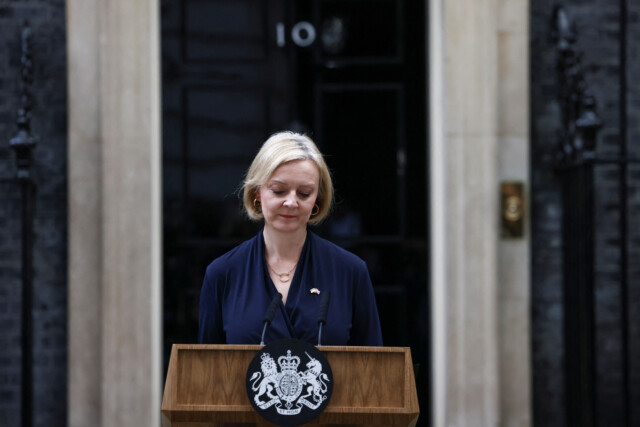
LIZ Truss will become the shortest-serving Prime Minister by 74 days.
The fallen Tory leader’s 44 days in office is more than two months short of George Canning’s 118 days.
Liz Truss will become the shortest serving Prime Minister
The fellow Tory’s time in office was cut short when he died from tuberculosis in 1827. Ms Truss would have overtaken him on January 3.
She resigned today after losing the confidence of her own MPs and the markets during a period of economic turmoil and U-turns.
It means King Charles is already set for his second Prime Minister just six weeks after ascending to the throne.
And the country is facing its third Prime Minister in four months.
A Tory leadership contest is set to be fast-tracked to be completed by next Friday. Party members are expected to be included in the process.
The other shortest serving Prime Ministers include Frederick John Robinson’s 144 days, Andrew Bonar Law’s 211 days and William Cavendish’s 225 days.
And last week Truss sacked humiliated Kwasi Kwarteng over their chaotic mini-budget. It made him our second-ever shortest serving Chancellor.
Ms Truss said today outside No10 Downing Street that she was elected on a mandate to change “a time of great economic and international instability”.
But she admitted: “I recognise, given the situation, I cannot deliver the mandate on which I was elected by the Conservative Party.”
Rishi Sunak, Penny Mordaunt and Ben Wallace and the frontrunners to be the next PM, according to the bookies.
Chancellor Jeremy Hunt will not be running to replace Truss.
Labour leader Sir Keir Starmer called the situation a “revolving door of chaos” that is damaging Britain’s economy and reputation.
Ms Truss was The Queen’s final Prime Minister and King Charles’ first.
She won a Conservative Party leadership election and was officially appointed PM last month in an audience with Her Majesty.
Her first audience with the King at Buckingham Palace was three days later on September 9, the day after the Queen died.
Ms Truss had promised a “bold plan” to cut taxes and grow the economy and “deliver on the energy crisis”.
But the mini-budget, unveiled four days after the Queen’s funeral, with its plans to abolish the top rate of income tax for the highest earners sent the markets into turmoil.
Ms Truss insisted she stood by the package but in the end sacked her chancellor, Kwasi Kwarteng, whose successor, Jeremy Hunt, ripped up the controversial budget by reversing most of the measures.







